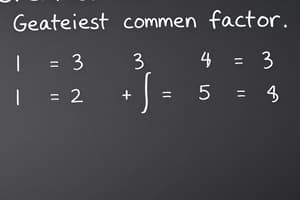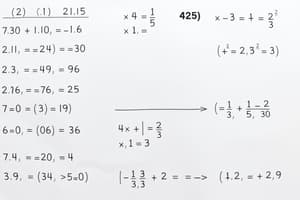Podcast
Questions and Answers
What is the purpose of factorisation in algebra?
What is the purpose of factorisation in algebra?
- To simplify expressions and solve equations (correct)
- To increase the number of terms in an expression
- To confuse students
- To complicate expressions
In factorisation by grouping, why do we rearrange terms in an expression?
In factorisation by grouping, why do we rearrange terms in an expression?
- To make the expression longer
- To factor out a common term from each group (correct)
- To keep the expression the same
- To confuse the reader
What is the factored form of the difference of squares expression "(x^2 - 16)"?
What is the factored form of the difference of squares expression "(x^2 - 16)"?
- (x + 4)(x - 4) (correct)
- (x - 4)(x + 4)
- (x + 4)(x + 4)
- (x - 4)(x - 4)
What is the formula for factoring the sum of cubes expression "a^3 + b^3"?
What is the formula for factoring the sum of cubes expression "a^3 + b^3"?
What is the result of factoring the expression $x^2 - 4$ using the difference of squares method?
What is the result of factoring the expression $x^2 - 4$ using the difference of squares method?
In rational factoring, what would be the result of simplifying $\frac{2}{x^2} - \frac{3}{x}$?
In rational factoring, what would be the result of simplifying $\frac{2}{x^2} - \frac{3}{x}$?
How is the technique of factoring by taking out a common factor applied to factorize $12xy - 18y$?
How is the technique of factoring by taking out a common factor applied to factorize $12xy - 18y$?
If given the expression $a^3 - b^3$, what is the factored form according to the difference of cubes method?
If given the expression $a^3 - b^3$, what is the factored form according to the difference of cubes method?
Flashcards are hidden until you start studying
Study Notes
Mastering Factorisation: Common Techniques Revealed
Factorisation, the process of breaking down an expression into its constituent parts, is a fundamental concept in algebra. Much like breaking down a complex puzzle into smaller, solvable pieces, factorisation offers a way to simplify expressions and solve equations. In this article, we'll explore some common factorisation techniques to empower your algebraic problem-solving skills.
Factoring by Grouping
Factorisation by grouping is a method that allows us to rearrange terms in an expression, factoring out a common term from each group. Here's an example:
[ 3x(x + 1) + 5(x + 1) = (3x + 5)(x + 1) ]
In this case, we factored out the common term ((x + 1)) from each group.
Difference of Squares
The difference of squares factorisation is a technique to find a factored form of an expression containing the difference of two squares, e.g., (a^2 - b^2). The general form is:
[ (a + b)(a - b) ]
For example:
[ x^2 - 9 = (x + 3)(x - 3) ]
Sum of Cubes
The sum of cubes factorisation is a technique to find a factored form of an expression containing the sum of two cubes, e.g., (a^3 + b^3). The general form is:
[ (a + b)^2 - a^2 - b^2 ]
Expanding, we get:
[ a^2 + 2ab + b^2 - a^2 - b^2 = 2ab ]
[ \therefore (a + b)^2 - a^2 - b^2 = 2ab ]
For example:
[ x^3 + 8 = (x + 2)(x^2 - 2x + 4) ]
Difference of Cubes
The difference of cubes factorisation is a technique to find a factored form of an expression containing the difference of two cubes, e.g., (a^3 - b^3). The general form is:
[ (a - b)^3 = a^3 - 3a^2b + 3ab^2 - b^3 ]
For example:
[ x^3 - 27 = (x - 3)(x^2 + 3x + 9) ]
Factoring by Taking Out a Common Factor
This method involves factoring out a common term from a single term or a product of terms. For example:
[ \begin{align} 2x + 6 &= 2(x + 3) \ 3ab - 9a &= 3a(b - 3) \end{align} ]
Rational Factoring
Rational factoring, also known as factoring by difference of quotients, is used when we have an expression of the form:
[ \frac{a}{b} - \frac{c}{d} = \frac{a \times d - b \times c}{b \times d} ]
For example:
[ \frac{x}{x + 1} - \frac{1}{x + 1} = \frac{x - 1}{(x + 1)^2} ]
Conclusion
Factorisation is a powerful tool in algebra that can be used to simplify expressions and solve equations. By mastering the techniques described above, you'll be well-equipped to tackle a wide range of algebraic problems.
Remember, this is just a brief overview of the most common factorisation techniques. As you deepen your understanding of algebra, you'll encounter more advanced techniques and applications. Keep exploring, and happy factoring!
Studying That Suits You
Use AI to generate personalized quizzes and flashcards to suit your learning preferences.




